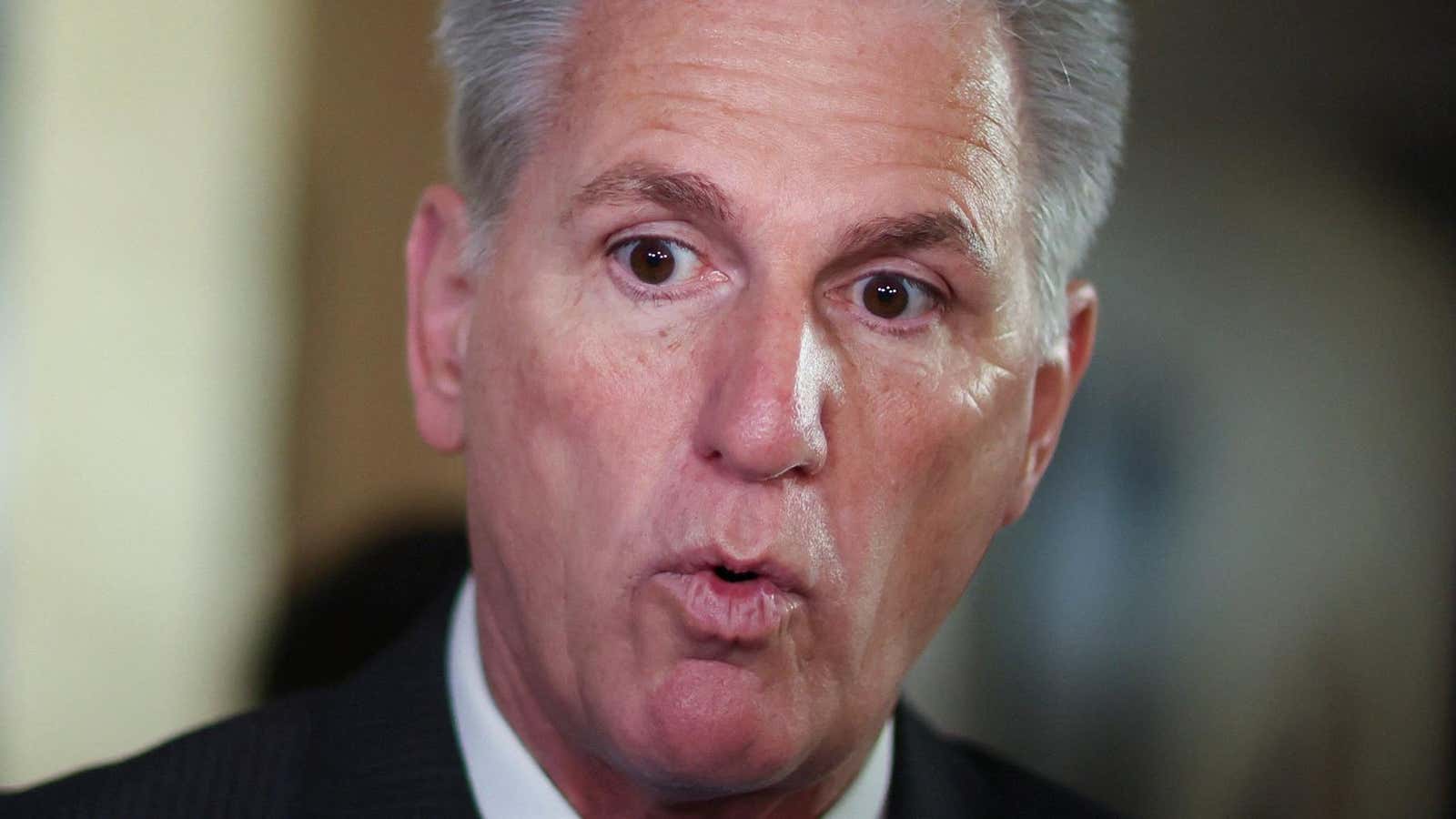Republicans in Congress are threatening once again to force the US to default because they lack the votes to enact their preferred fiscal vision.
Yes, it’s debt ceiling season once again. For those not following along at home, US law imposes an arbitrary limit on the amount of money the government is allowed to borrow. Historically, this was intended to make borrowing easier. Today, it is a tool for brinksmanship, with Republicans threatening to block paying the bills they already voted to incur unless GOP demands for unspecific spending cuts are met.
Right now, the US is at the limit, and the Treasury Department is moving money around to delay a conflict until later in the year. But if the limit is not raised, the US faces a constitutional crisis: How can the president execute the laws set by Congress if those laws are contradictory? (Here’s a flow chart for your consideration.)
The last time a real debt ceiling face-off happened in 2011, the US had its sovereign debt rating downgraded and incurred more than a billion dollars in economic losses. So let’s set aside the hypocrisy and political posturing and ask a simpler question: Is there a debt crisis that would justify holding the economy hostage?
And the answer is no. Markets are not worried about the US paying its debts, and there are no bond vigilantes appearing out of the woodwork.
That’s because the US is an enormously wealthy nation with a growing economy. The US has a lot of debt, about $22 trillion, equal to about an entire year’s economic production. But the US also has a lot of wealth—about $137 trillion (pdf). It’s true that interest rates are rising, but only because the Federal Reserve is pushing them up. Investors are still betting that rates will fall soon, with the interest paid on ten-year Treasury bonds lower than on government debt due in two years. That yield curve inversion reflects expectations that the Fed will cut rates during a potential recession. But even absent a downturn, the Fed isn’t likely to hike more than expected next year thanks to slowing inflation.
Public debt is stabilizing. How do you shrink it?
And what’s the trend for federal public debt? After a huge surge driven by pandemic-driven public spending, borrowing is set to shrink as a share of the economy in the years ahead. These Congressional Budget Office forecasts are from May 2022, and don’t include changes from legislation like the Inflation Reduction Act or updated economic data, but the figures do offer a best guess at what we can expect:
Many policymakers and economists fret that publicly-held debt approaching 100% of annual GDP is too high. The “correct” level of debt is difficult to assess; researchers think too much debt can be a drag on growth, but only if it crowds out private spending or leads to higher interest rates. The global economy, however, is in many ways dependent on a steady supply of US debt. Perhaps the biggest reason to push down current borrowing is to make sure the US has the fiscal capacity to weather the next emergency. One thing that won’t help reduce the debt, however, is a financial crisis caused by debt ceiling brinksmanship.
Despite the Fed’s tightening, growth remains strong and unemployment is low. That’s arguably a good environment to reduce government spending after the enormous surge in pandemic aid. Spending is already falling faster, as a share of the economy, than it did after the 2008 recession.
There are ways to keep driving spending down (pdf), but they require delivering pain to somebody: Eliminating subsidies to everyone, from agribusiness to defense contractors, leads to lobbyists for affected industries pounding down lawmakers’ doors, while cutting benefits to children, the sick or the poor remains broadly unpopular. Tax hikes can be more palatable but can generate political repercussions among influential upper class voters.
The last time anyone tried to hash out a compromise on all of this—the 2011 glory days of the Bowles-Simpson commission—Republicans backed out because of proposed tax increases, and Congress wound up cutting spending 10% across the board. (Republicans reversed many of the cuts when President Donald Trump took office in 2017.)
Debt politics are different in 2023
Absent the specter of the European debt crisis or a Republican party united on fiscal issues, the politics of debt reduction sit differently. Some Republican politicians, like Trump and Senate leader Mitch McConnell, are already warning that the cuts for popular but expensive programs such as Social Security and Medicare implied by a debt default aren’t going to help the party gain power in the next election. Republican member of Congress Nancy Mace told NBC over the weekend spending must be cut but couldn’t name a single target for reductions. Instead of cuts, conservative Democratic Senator Joe Manchin is pushing to lift the limit on taxable Social Security wages.
It’s easy—it’s always easy—to imagine the Biden White House coming together with Republicans in Congress to find a moderate deficit reduction package that raises taxes and cuts some spending. The White House certainly imagines it, since administration spokespeople such as Treasury Secretary Janet Yellen have made clear it won’t engage with novel plans to avoid a debt ceiling crisis like minting a platinum coin or various other finance shenanigans. Still, the patience—or complacency—about the debt ceiling might leave Washington in an uncomfortable place come this summer: It remains to be seen if the hardliners among Republicans have the patience for bipartisan legislating. If global investors won’t give them the debt crisis they want, they seem eager to create it.
